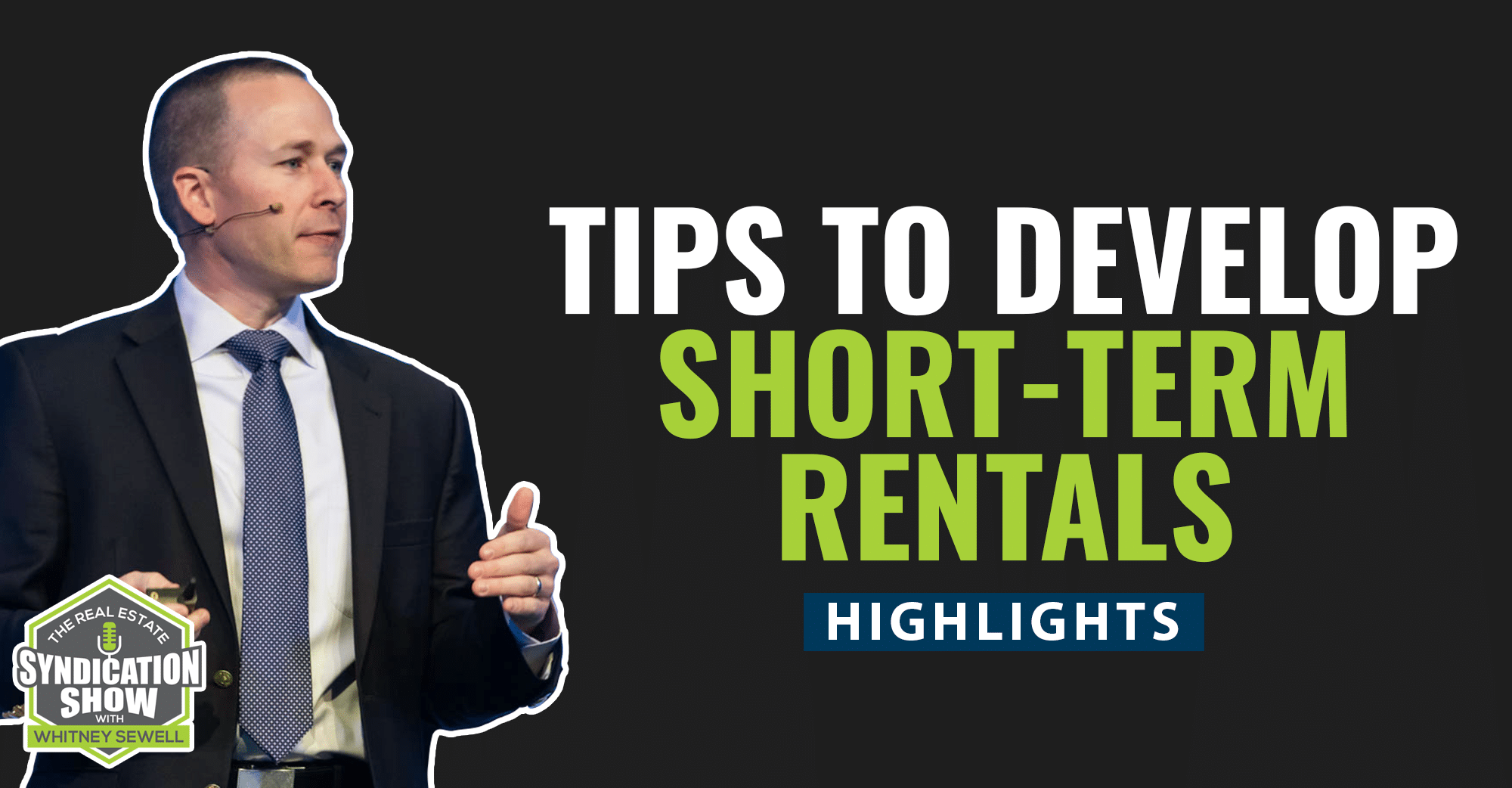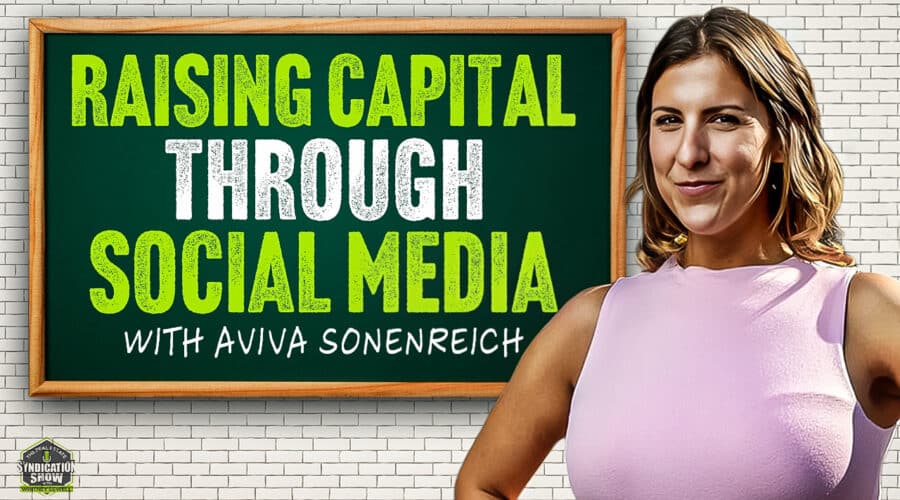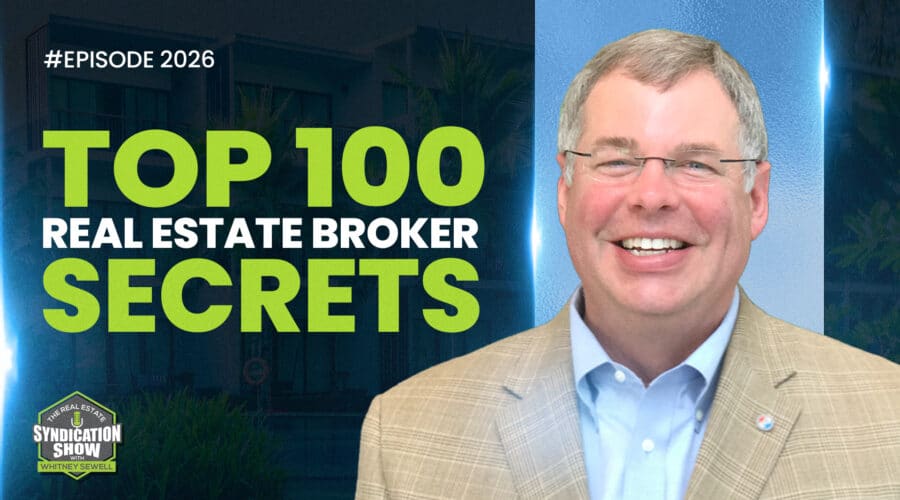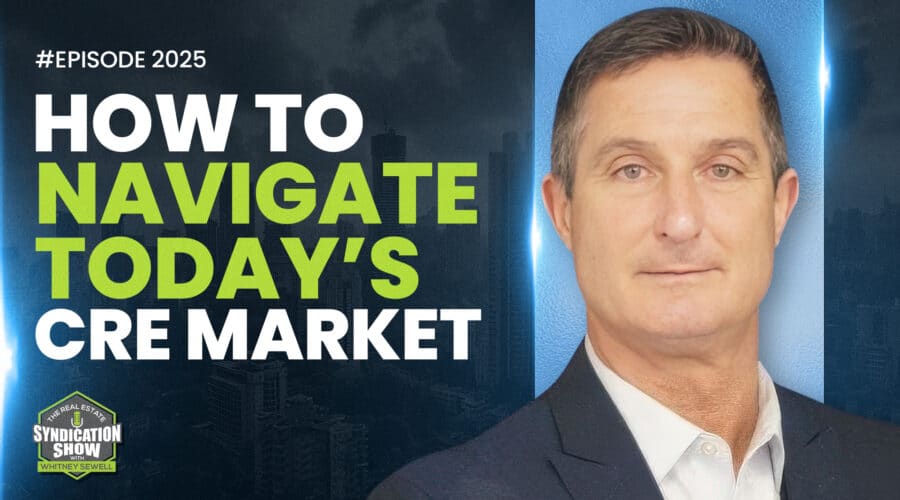In this #Highlights episode, we look back at our conversations with Blake Dailey and Alex Jarbo. Blake Dailey is a multifamily real estate investor as well as an Air Force Contracting Officer. He used the BRRRR strategy to buy, rehab, rent, and refinance residential properties, and then do short-term rentals using Airbnb, which is where the ‘nb in BRRRR’nb comes from!
Watch the episode here:
Listen to the podcast here:
Short-term rentals have gained momentum especially since people are starting to travel again. Alex Jarbo shares his unique development strategy for syndicating short-term rentals and teaches the ins and outs of short-term rental development and management.
Key Points From This Episode:
- Blake describes going through the real estate investing process with his wife.
- How many short-term rental units did it take to replace his W2 income?
- How to branch into commercial multifamily from short-term rentals.
- How to finance short-term rentals through creative financing and relationships with local banks.
- How to transition from self-managing the property to bringing on a property manager.
- Alex shares his first real estate ground-up development.
- Why does Alex choose short-term rentals and not long-term rentals like multifamily?
- How did Alex scale his short-term rental business?
- Short-term rentals are properties that offer experience in themselves.
- How did a mentor help Alex to drive his business forward?
- Alex details the short-term rental projects he is syndicating.
Tweet This!
“Commercial multifamily is the way to do less transactions, have bigger payouts, and have the time reward be more, economies of scale, really. You hear that all the time in commercial multifamily. It’s scalable and there’s efficiencies built in.” –Blake Dailey
“When I look at my goals and where I wanted to be at that time, the way to fast track that is through short-term rentals. I think that’s why a lot of people gravitated towards that in the last three years because they realized how many short-term rentals can actually make.” –Alex Jarbo
“I say Instagram-able properties is what you want. People are excited to stay in your house, it is not just a place where they are sleeping. The property is an experience in itself, outside of the city that they’re visiting.” –Alex Jarbo
Links Mentioned in Today’s Episode:
The Multifamily Journey Podcast
WS870: Financial Freedom in One Year with Multifamily BRRRR’nb with Blake Dailey
WS1251: Syndication of Short-Term Rental Development with Alex Jarbo
About Blake Dailey
Blake Dailey is a multifamily investor interested in long-term wealth creation and helping passive investors achieve returns that can fuel their lifestyles. He focuses on syndicating larger value add or multifamily acquisitions, and he has experience with wholesaling, short-term rentals, and BRRRR. He is also an active-duty Air Force Contracting Officer.
About Alex Jarbo
Alex Jarbo is a short-term rental developer and manager. He was born and raised in Detroit Michigan. He served in the Marine Corps for 4 ½ years where he was stationed in Washington DC apart of the Marine Corps Honor Guard. He left the Marine Corps at 22 years old to pursue his career as a real estate professional. He is the founder and CEO of Sargon Investments and he has a goal of developing 650 cabins in the next 3 years. Alex holds an MBA with a concentration in Real Estate Development and is currently finishing a Doctorate in Business with a concentration in Leadership. He is the host of the YouTube Channel Alex Builds where he teaches the ins and out of short-term development and management.
Full Transcript
EPISODE 1638
[INTRODUCTION]
Whitney Sewell (WS): This is your Daily Real Estate Syndication Show I’m your host, Whitney Sewell. Today we’ve packed a number of shows together to give you some highlights. I know you’re gonna enjoy this show. Thank you for being with us today!
[INTERVIEW 1]
WS: Our guest is Blake Dailey. Thanks for being on the show, Blake.
Blake Dailey (BD): Hey, it’s awesome to be here, Whitney. The first deal we bought was a house hack and we rented the extra unit out with Airbnb, so I saw that as a strategy we could gain higher cash flow and we’re in a good market for it. When we did our first BRRRR, this is my wife and I, we did all the work ourselves, stayed up till midnight, two weeks straight, doing this rehab. This had two units and a pool, so we created this. This is our first BRRR’nb, and I like to put that name to it. It’s the BRRRR with Airbnb at the end and you just rent it as a short-term rental. This house, because it had the two units, we created three listings so we had the main house, the guest house, and then the third listing would be the whole place together so you’d rent it for big groups, and it had a pool. I mean, really good-looking property and a good area close to the beach and all that.
WS: That wasn’t the one you were house hacking, right? Or it was?
BD: No, this is the second one. Now, at this point, we’ve got three short-term rental units, cash-flowing really well, and then in the mid-2019, we added four more, so now we’re up to seven. Once we got to that point, we’re up in cash-flowing, the listings are running, and now that has surpassed my W2 income as an Air Force officer.
In pretty short amount of time with a low number of units you could say, seven units and three long-term units right now, we’re at our financial freedom number, which has replaced my W2 income.
WS: Congratulations by the way, that’s incredible. I mean, it is, it’s incredible, that’s what most are dreaming of, we all did at one time if you’re not already there. I know that didn’t come without a lot of work. I appreciate you saying like, you and your wife did that first BRRRR, you did it together, and can you shine the light into that a little bit? You and your spouse, doing this together, I’m sure it wasn’t always easy. Were you always on the same page, it’s her vision the same as yours, tell us a little bit about that?
BD: Yeah, we were kind of opposites and I drug her into it. During this whole time, she’s been getting her doctorate, she just graduated in December with her doctorate in physical therapy. While we were grinding to build up this portfolio, she was also grinding to get her doctorate so, you know, a lot of credit to her for allowing me to do this.
Yeah, I think that has been a struggle and like an area of conflict for us and we’ve been dealing with it better but it’s definitely just trying to support each other and she’s been great and I should be better to support her more but, yeah, I think starting out is just showing her this vision of where we could get if we got this number of properties, and got this number of cash flow. On and on and on and just try to show her that.
Her whole thing was, “I didn’t go to school for real estate.” Always an uphill battle and we’re still trying to figure out how to do it now but now that we have more systems in place and have the managers, it’s a lot easier on us. She can focus on her thing now as well.
WS: Yeah, no, that’s awesome, I love hearing just some of the real stories behind some of that because I lived that myself and my wife has just been amazingly supportive. It’s been amazing. You know – you got to have to kind of paint that picture for the whole family.
BD: Yeah, we definitely don’t deserve our wives, it sounds like.
WS: That’s for sure. No doubt about that. House hacking, by doing the first BRRRR with her, just congratulations to you both in just making that happen. Because obviously, she had nothing going on while getting her doctorate, right?
BD: Yeah, she had nothing but free time.
WS: Right. How quick then did you get enough properties or close on enough deals to gain that financial freedom number? And then I want us to talk about just your path then from that to syndicating.
BD: We closed our first deal, the first house hack in July of 2019, and this was at the end of July. By the first week of August of 2020, really 12 months, 12 and a half months, whatever, we had all the properties up and running, all the new Airbnb’s up and running, and cash flowing, guest coming in, Airbnb payouts coming so really, 12 months. It sounds like a short amount of time but I can attest, it was a long 12 months. It was a lot of late nights, a lot of early mornings, and a lot of work went into it. Probably 90-hour weeks.
That’s not the path for everybody but it’s just what I wanted to do and I had this goal and wanted to get there.
WS: How many units was that?
BD: In those 12 months, that was 11 units, seven of them were short-term, three of them were long-term, and one we’re living in. Then, from there, we started – well, really kind of before that, kind of about the time that you came on that show, on the mastermind, it was probably March-April timeframe, kind of when COVID hit. I reevaluated the business, all the time that I was doing my real estate tax, all the time it took me to close these deals, and all the time I was spending on maintenance on all my properties across the county now.
It was just taking me a lot of time, I saw a lot of inefficiencies there and, through that, I had this realization that I could do less work by focusing on less transactions. I was wholesaling as well so I mean, the high-volume kind of stuff. Because of that, I saw commercial multifamily is the way to do less transactions, have bigger payouts, and have the time reward be more. Economies of scale, really. You hear that all the time in commercial multifamily, it’s scalable, and there’s efficiencies built in. That’s where I started self-educating and putting the systems in place, that once I saw those deals wrapped up in the August timeframe, focused a lot more time to the commercial multifamily and that’s what led me to syndicating my first deal now.
WS: Why not continue doing short-term rentals just like you’ve been doing since it was so successful?
BD: That’s a question I’ve asked myself and it’s been kind of this internal conflict because I do really like the strategy and the market that I’m in, it’s just really great for it and I’m actually doing another one right now. I got an eight-unit that I’m supposed to close on Monday but the seller’s giving me a little headache, so we’re dealing with that, but this is eight unit in Fort Walton Beach, in a good area. Trying to close on that and that’s going to be eight Airbnb units, a big BRRRR’nb.
WS: That’s massive when 11 got you where you’re at and then you’re going to – more than half that, just in one deal.
BD: Yes, I’m still doing both because now, for the BRRRR’nbs and especially in the local area, I have the systems in place, I have the property manager, I have the contractors, really everything I need now. With syndicating, my rule, in this deal anyway, has been more of a capital raiser, investor relations deal. Really, I’m not the day-to-day operator, spending a bunch of time but vetting the deal, bringing capital to it.
That’s kind of allowed me to balance these two acquisitions that are really a week apart from each other now.
WS: How’d you finance all the short-term rentals?
BD: For the short-term rentals, like I was saying, it’s like every way of creative finance you could think of. We have used hard money, we’ve used private money, we used seller financing, really, anything that are just disposable. I read Brandon Turner’s book, The Book on Investing in Real Estate with No (and Low) Money Down, and then I’ve done everything out of there except a loan assumption.
From the very beginning, I knew my own capital was going to be an issue. The goal then became to find really good deals so that I could find private or hard money, one of those creative solutions and then BRRRR the money out, give the investors their return back, and then I’m holding on to the property with fresh debt on it that’s in my name and cash flowing.
WS: Nice, no, that’s awesome. Then, everybody wonders, right? Because that’s one of the difficult parts is getting financing for that many deals and so, moving forward with the short-term rentals, has the financing changed at all, or has that gotten easier, what does that look like? Because I know that’s a common question. We want to get to syndication, however, it’s hard to get started and getting that financial number like you had.
BD: Yeah, absolutely, that’s a really good question because that’s a question I get from other people trying to do the strategy too is like, how do I get financing? I can’t get a bank, you know, Fannie Mae and Freddie Mac won’t loan on short-term rentals so what I’ve done to overcome that is I have a local community banker credit union that does commercial loans in-house, they have portfolio loans in-house. Then it’s my loan gets submitted to the person that I’ve been talking to, I have the relationship with, they know my business, they know what I do and they kind of – my track record of doing deals. By finding that local bank that does commercial loans, I’ve been able to overcome that and then as I’ve talked to other people, they’ve been able to do the same thing and set-up that kind of financing. I think, in the beginning, to get to that number and to find really good financing, especially if you can create the relationship, is with local banks.
WS: What about managing, are you self-managing these or are you hiring that out?
BD: I started out that way and me and my wife did up to three ourselves and we had the systems in place. We were using all the management tools and doing well at it, but still there’s that ongoing guest communication and involvement that me, working full-time and spending an equal amount of time investing, just didn’t have the time to. We kind of learned everything that we wanted by self-managing and then handed it off to a property manager, I think, in September.
WS: Is that someone that’s specific to short-term rentals or is that just like a local manager who is used to managing smaller residential?
BD: Yeah, it’s specific to short-term rentals. I’m actually changing right now to a local manager, the one I was using was out of the market but had the systems to manage everything and I had my cleaners already so we just paired those two. The cleaner I’m switching to now is more specialized to this market, has the system and the people in place for me to be more hands-off and oversight rather than in the day-to-day.
[INTERVIEW 2]
WS: Alex, welcome to the show. You are one of the very few short-term rental people I’ve had on the show who are actually syndicating short-term rental projects and developing, I would consider pretty large, you know, short-term rental properties. I think it’s a very unique business model that you have. I’m, looking forward to getting into that you know.
I want to ask you why did you start to focus on short-term rentals? Not, you know, not like this moment, as far as in the market cycle, and everybody focusing on short-term like you just said. But why did you gravitate in the beginning to short-term rentals versus say buying that triplex, fourplex with your Va loan and just running them out long-term? What was about short-term rentals for you?
Alex Jarbo (AJ): So I was just looking behind you, we have a lot of similar books on our bookshelves in terms of real estate. So I sat down and probably read, at that time like at this point, I probably read over 100 real estate books, but at that time maybe about 30 or 40 real estate books. Only one of them was geared towards short-term rentals because there were there wasn’t really too much information out there on them. What I realized was like reading the multifamily books, reading the flipping books, reading the single-family, house long-term rental books, the cash flows were like you’re lucky to get anywhere between 3 to $600 cash flow per property.
What I was seeing on the back end of like some of these people who I was reaching out to the types of cash flows they were getting, it wasn’t even close it was like owning 5 to 10 single-family houses compared to owning one cabin. So that’s what, when I looked at my goals and where I wanted to be at that time, I was like the way to fast track that is through short-term rentals.
I think that is why so many people have gravitated towards it in the last 3 years is because they’ve realized how much these short-term rentals can actually make, especially the unique ones like the ones that are cabins, A-frames, or some type of that are unique in terms of like the design if they’re like condos or something. So people, just really cat out of the bag like the cash flow phenomenally, and that’s what. And right now it’s like with there being like a shortage of inventory and a lot of people coming from like the long-term rental side who are saying, “Hey, I just want like a 10% cap rate. I’ll be happy with that.” I don’t think that’s what prices have been driven up a little bit. But yeah, just the cash flow tasks.
WS: Okay. So it’s really that simple. I mean, you notice just more cash. flow. But tell me about then the process of just being able to scale it, right? I mean it sounds like I don’t know too many people, or maybe anybody that can think of right off that scaled the short-term rental business where they’re developing a $10,000,000+ project right around short-term rentals. Speak to and it’s interesting that your first project was a development, you know, and maybe you can start there. Why was the first project a development? And how did you know that that was something you could tackle to where you scale, and then move into scaling to syndicating these same types of deals?
AJ: Yeah, I didn’t want to purchase a property that that was just a normal that I could just put on the short-term rental sites, which still do pretty well right now. And all the properties that were either cabins or something unique about them that would do well as a short-term rental were just way too expensive compared to. I had a builder friend who ended up building my first project. We had like just figured out like price per square foot and everything.
Our first project was an A-frame. It was like a 900 square foot, A-frame that grossed like $81,000 last year, and then netted like 50 grand. So, that’s sort of why I gravitated towards the development side was that it was like at the time we could build them cheaper, and even right now, it’s obviously things have gotten way more expensive with Covid and stuff with like both labor and cost of materials, but it’s there’s no inventory for short-term rentals right now at least in the hot market. So it still makes sense to develop the short-term rentals over just purchasing
WS: Did you, you know, like even that first project, or even to now, but especially that first one, how did you know or have confidence in what the land was, you know, the value of the land was and knowing that “hey, we can go build something with things that are happening with materials and material costs or shortages. Where did that confidence come from to say you know what I’m gonna buy this land, and we’re gonna move forward with developing this?
AJ: Yes, so my first one was around like 2017, which I when I started looking for the land. I leaned pretty heavily on my real estate agent, and this is what I always tell people is to figure out what an acre goes for in your area. We’re developing more rural areas maybe about 15, 20 min away from the city. But we also live in an area that people are used to driving so like It’s a driving city or airport, it’s not really that big. So they’re comfortable making that drive, especially like we’re known for like hiking trails at waterfalls and stuff. So people are used to driving 45 min to an hour to even get to these locations.
Figuring out the price for acre is a big thing starting off and then figuring out like press for a square foot with your builder. And then from, I keep saying unique properties, but, like deep properties, what’s gonna you market your property very easily on the short-term rental site. So I say Instagram-able properties are what you want, people who are excited to stay in your house, where it’s not just a place that they’re sleeping where the property is an experience, and in itself outside of like the city that they’re visiting.
WS: Nice. That’s something to think about right there – Instagram-able property. But the unique property experience, I like that versus just the surrounding, the things that you can’t change, you can change that property. You mentioned you started driving around, you’re looking at 30. 40 properties or more, you know, just to buy one. But there’s really this best use of time issue right? What is the best use of time.? How did that change? How did you change that to where you’re not driving around looking at 50 properties to buy one? What happened there?
AJ: One was, I mean, I got a real estate development mentor to sort of help me really focus on what my goals need to be, where I need to be, what I need to be doing right now, to where I need to be at, maybe in a couple of years. When you start purchasing some of these larger parcels, I mean it there aren’t as many of those on the market, like say, maybe one to 5 acres. So like I mean take, for instance, like there probably be at any given time, 3 to 400 of those like acre to 5-acre parcels on the market compared to like at what we’re purchasing anywhere between 40 to 100 acres right now, there’s only maybe like 60 of those on the market.
So a lot of the time, I’m looking at, I won’t even drive out to the property without doing my research on the computer and what that looks like is. We live in the mountains where we operate in mountains. So we’re looking got how steep the land is through our county website, and then they have certain parameters that determine if we’re going to be in something called a steep slope ordinance or protected ridge ordinance that we usually don’t build in because it takes way more time to get extra permits, and then it also costs more to build the foundation where we’re building at a certain elevation. So that’s one way to completely like just decide if we’re gonna, I’m even gonna drive out to the property.
And another thing, too, is making sure, for people who are actually wanting to do this themselves, or if they’re looking at purchase property is the drive up to the property is very important. You don’t want your guests to be driving 20-30 min down a gravel road, and you like you might see a listing, and you’re like this is absolutely beautiful like why is it probably that way below market or whatever. More than likely It’s probably going to be the drive because you don’t want your guests to be annoyed by the time they even get to your property. A lot of times they’re driving to you at night, it’s gonna be a new area that they’re not used to. And so, once I decide to go out and look at a property, that’s the first thing on my mind is like what’s the guest going to be thinking about what as they’re driving to this property.
So a way to give way to fix that is just to invest in property that’s off of like a double lane state maintained road, a paved state-maintained road. And then you can put in your own road like we’ll put it anywhere between like quarter mile to half a mile of road to get to the house.
WS: Nice. Now that’s some great things to think about, and I want to get into some of those specifics in a moment, too, about just short-term rental, some tips, that you have. But, can you share an example of a deal you’re syndicating, maybe, or some things that to consider, maybe the listener’s thinking about syndicating, you know some type of short-term rental or this is intriguing them. Speak to maybe a current project, or a past project that you syndicated, you know, and what that looks like? You know the type of land maybe? What type of buildings are you putting on their homes, or what are you building?
AJ: For the people who are listening, just under, like on the syndication side and raising money for development in general, like just understanding that there is more risk involved like especially with like with coming out of Covid now, we’re at least like things settling down a little bit where like things can go wrong like if there is more risk there, but there is more reward that’s I mean that’s why we’re doing what we’re doing. But when it comes to the syndication side, we’re raising the capital just like normal syndication. I’ve leaned pretty heavily on the multifamily model to establish what we’re doing here.
Our very first like, I guess larger joint venture that we did was a $2,000,000 project, 6 cabins right next to each other, and we’re the investors had put up almost all the capital, and it was just a trusting, just with multifamily or anything, just making sure that your investors trust you that even if they’re accredited, just making sure that they understand the process upfront. You need to understand the process, and that comes from under like if you need to get a specific permit with the county like we need a specific vacation rental complex permit with our county that took about 3 months.
So just really making sure that you understand what your county or city requires for short-term rentals. That’s probably the most important thing when it comes to syndicating deals like this – being upfront with your investors and telling them, “Hey, it’s gonna take this long to develop these projects. Are you comfortable with that like having your money tied up there?”
It’s not like a multifamily project where it probably will cash flow right out of the bat. Or even if you’re updating some of the units most of the units are still rented out or something. It’s not like hitting the ground running with stuff like that. And we do invest in properties where like it’ll be like a cabin, and maybe there’s like 10 to 15 acres attached to it or we’ll make have plans to develop another 10 cabins decks to it. That was more like a break, even thing where our holding is. We do break even on the holding call for the whole development project. Before we started this interview, it was very creative and every project was going to be different
WS: Yeah, it’s just such an interesting model. You mentioned, like, maybe only 60 properties like that on the market. That’s what like, you say 40 to 100 acres. Roughly, I mean, is that like nationwide? Is that like in a certain area with that you’re looking?
AJ: That’s within our county.
WS: Okay, in our county.
AJ: Yeah, which is still a lot I mean that’s a good number. But again, as I would say, 70% of them are in that steep slope ordinance that we’re talking about. And then we also have plans on getting, the beauty about the mountains is you can drive an hour in any direction, and you’re in a completely different market like an hour and a half for us is like pigeon forge Galenberg, the Smoky Mountains and stuff. So we do have plans on getting into other markets that I’ve identified, that I believe are up and coming. Asheville’s very competitive right now in terms of both properties and land.
Yeah, we do have plans are getting on to other like mountain markets that are within an hour and a half to us, which I mean there’s probably about 10 of them. And then we’ve looked at 2 of them that have decided to go into.
WS: Awesome. Speak to maybe the market selection there. You know, how do you know that it’s a market that you’re willing to go buy, you know, 100 acres in and start developing for short-term rentals?
AJ: Yeah, I forgot where I heard of it but people like views, and people like being up top. Like they like being high, like, say, like in New York, like you go to a sky rise, and you like looking down and like like looking at like a scenic view. So you when I invest in a market that’s pretty scenic. I’ve realized mountain communities, and this is maybe excluding the West Coast, but mountain communities, mountain cities, are a little bit less seasonal than say, like beach towns. Beach Towns like say like if you’re looking at the coast in North Carolina like in the outer banks’ suit. That’s a little bit more seasonal than saying here in the mountains. We’re a year-round market.
We have our high season, which is going to be later summer. And then the foliage or the leaf season in October, November. But for the most part, we cash flow pretty good throughout the whole year. So mountain communities. you want there’s like 3 steps: it’s like you want to be in a cabin when you’re in the woods, you want a hot tub and you want to mountain view. And that’s sort of the 3 things that we look for. Obviously hot tubs are pretty easy, but the design of the property and then also some sort of scenic view.
One thing I always tell people that asked me that question is, you want a full-proof way honestly is to invest in areas that are close to a National Forest or a National Park because you already have a built-in audience that is already visiting these parks. I mean with Covid like the national parks, all like record numbers in the last couple of years, like, I think the Smoky Mountains alone sell like 20,000,000 visitors.
So there’s a shortage of inventory there in terms of like where people want to stay at. They might be staying in a boring hotel just to be able to stay in the Smoky Mountains. That’s probably the quickest way to answer that question is to look at that markets that are close to National Forests or National Parks.
[END OF INTERVIEW]
[OUTRO]
Whitney Sewell: Thank you for being with us again today. I hope that you have learned a lot from the show. Don’t forget to like and subscribe. I hope you’re telling your friends about The Real Estate Syndication Show and how they can also build wealth in real estate. You can also go to LifeBridgeCapital.com and start investing today.
[END]
Love the show? Subscribe, rate, review, and share!
Join the Real Estate Syndication Show Community:







